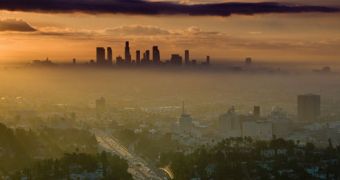The journal Atmospheric Chemistry and Physics recently published a new research stating that atmospheric pollution levels will only continue to increase as time goes by, but for implementing stricter standards aimed at regulating air quality.
Working on the assumption that US industries will continue to go about their business unhindered, developing and encompassing ever more branches, scientists found that, by the year 2050, individuals across the world will breath in air whose quality would be very much similar to that presently inhaled by people living in East Asia.
The researchers focused on five of the most widely spread air pollutants, PM2.5, nitrogen dioxide, sulphur dioxide, ozone and carbon monoxide, which reach our atmosphere both as a result of human activities, and because they are released by various natural phenomena such as volcanic erruptions.
Thus, after looking into how air concentrations for these chemical compounds will most likely evolve over the years, the researchers concluded that people living in eastern China, northern India, the Middle East, and North Africa will soon find themselves at the center of so-called “pollution hot-spots.”
The official website for the European Geosciences Union quotes Dr. Andrea Pozzer from the International Center for Theoretical Physics in Italy, who explains that, “Strong actions and further effective legislation are essential to avoid the drastic deterioration of air quality, which can have severe effects on human health.”
Apparently, at its present day levels, air pollution is already responsible for several health conditions having to do with the respiratory system. Moreover, nearly 1,3 million annual deaths can be linked to poor air quality.
Hopefully, future environmental legislations will focus on cutting down on air pollution by pushing for investments in renewable energy sources.
Truth be told, from where we stand, efforts are already being made in that direction and it is highly unlikely that national governments and ordinary people will simply allow for air quality to degrade to such an extent.

 14 DAY TRIAL //
14 DAY TRIAL //